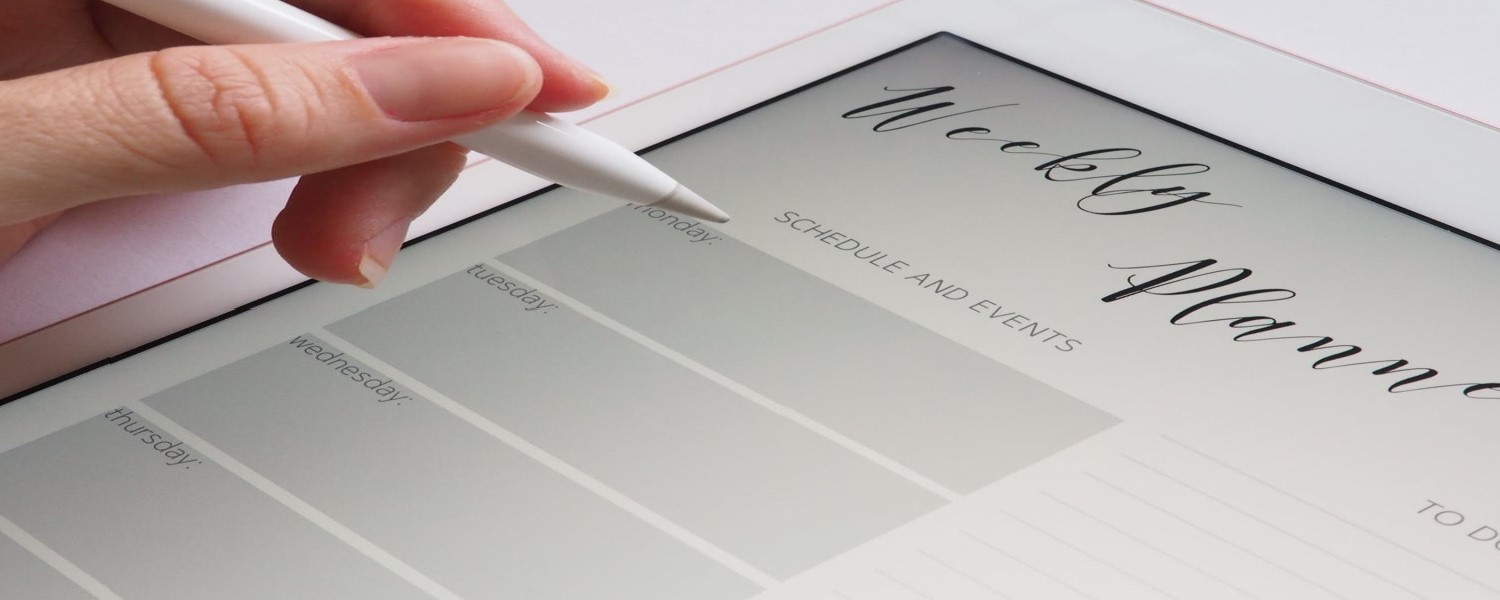Thank God It’s Monday! This is How to Plan Your Week
I have had several recent requests from readers and friends on writing a blog post about how to plan your week. One even went so far as to say that it would be helpful to others since I am “obsessed with planning.” I personally do not believe I am obsessed with planning, but I suppose you can be the judge of that after reading this post! In my opinion, flying by the seat of your pants is a recipe for disaster. Now, some of you may already have enough structure in your lives due to how your job is structured (think doctor’s who have appointments scheduled throughout the day). For the rest of you, I am going to provide the structured process I use, as well as some other go-to tips that will hopefully have you saying: ‘thank God it’s Monday!’ when that alarm clock goes off on Monday morning.

Why it’s Important to Plan Your Week Ahead
There are many reasons to plan your week ahead of time but to me, it all boils down to being in proactive mode rather than ending up in reactive mode.
Some of the other reasons include:
Cracks!
Less stuff will fall through them. By not taking time to think and plan stuff out you will invariably forget to do things.
Progress
Planning helps you keep a record of what you have done, which shows both your progress and accomplishments.
Accountability
If you plan your week ahead, it will help you hold yourself accountable and stay on track.
Hit the ground running!
Instead of wasting time figuring out what you need to do, it will allow you to hit the ground running first thing Monday morning.
More focus, less stress
Flying by the seat of your pants and being in reactive mode can cause you a lot of stress. By being proactive and planning your week you are able to be better focused with much less stress.

Less Likely to Say Yes to Attractive Distractors
By having a fairly full plate, it will make it easier to say no to attractive distractors that get you off your game. I’m not saying you have to stick to your schedule 100% of the time, of course not. What I am saying is that you will have the opportunity to make a judgment call when those situations do come up. And sometimes you will want to say yes to other things.
You Will Say “I never have enough time” Much Less!
By being strategic about how you plan your week you will make time for everything that matters.
Ok, now that we have looked at some reasons why it is a good idea to plan your week ahead of time, let’s dive into some things you may want to consider when you plan your week.
Sunday Funday!
The last thing you want to do is plan your week once the starting gun has gone off and chaos starts happening around you. You will be unable to take the necessary quiet time to think and strategize to do it properly.
At a macro weekly level, I utilize a concept I learned from Jack Canfield’s book The Success Principles called ‘Redefine Time’. The idea is to have 3 types of days: best results days, preparation days, and rest and relaxation days. Best results days are those days where you spend at least 80% of your time executing on whatever your primary area of expertise is. Preparation days are when you plan for best results days by learning new skills, training, strategizing; whatever you can do to maximize your time during your best results days. Finally, rest and relaxation days are days free of work where you can relax and recharge.
For me, I use Sunday’s as my preparation days, and that is where I plan my week ahead. I usually go to Starbucks on a Sunday morning, grab some java and take an hour or so to plan my week. In case you are wondering, Monday through Friday are my best results days and Saturday is my rest and relaxation day.
The Power of 3
Before we get into my process in a bit more detail, let’s first discuss what I call the power of 3. I really don’t remember where or whom I picked this up from, but it has really served me well over the years. I set goals or objectives in 3’s, going from macro to micro. So, I set 3 big goals for the year, 3 big goals for each month, 3 big goals for each week, and 3 big goals for each day. This does a couple things: it forces you to really think and get clear on what you want to accomplish, and it helps you get more work done as you are laser-focused on what’s important.
Let’s now review the steps in my process that you can use to plan your week:
My Process
(1) Block time
We already discussed this, I take an hour on Sunday morning for planning.
(2) Review the previous week
Next, I will review what happened last week:
 What did I accomplish? What went well?
What did I accomplish? What went well?
 Is there anything that didn’t go as planned? Why? How can I do better this coming week?
Is there anything that didn’t go as planned? Why? How can I do better this coming week?
 What did I learn? (every day I write down 3 lessons learned) By reviewing what you have learned will help cement those lessons in your memory.
What did I learn? (every day I write down 3 lessons learned) By reviewing what you have learned will help cement those lessons in your memory.
(3) The Power of 3
Next, I review my Big 3 for the year and month – which should be related. For example, one of my Big 3 for 2018 was to write 170 blog posts. I then create my Big 3 for the week by asking myself, “if I can accomplish just 3 things this week to make it an awesome week, what would they be?”
(4) List of Tasks
I then create my big list of tasks I need to accomplish for the week. I have a strategic Big 3 for each day that will help me accomplish my Big 3 for the week. Then I have a bunch of other tasks and activities that I need to schedule in, you can call these recurring tasks. The recurring tasks I break down into several areas:
Morning routine – meditation, journaling, make my bed, cold shower, eat/coffee etc.
Gym time – 2 hours each day with one recovery day.
Errands/admin – running errands, paying bills, doing laundry groceries.
Social time/fun/relax – going out with friends, calls, emails – I believe you need to take time to play and let your brain focus on other things. I often have many of my best ideas on these days.
Reading and thinking time – I schedule time each day for both.
(5) Schedule the week
Lastly, I schedule out my days. There are a few things of note to keep in mind when scheduling:
Pick a medium
Personally, I like to go old school and use pen/paper but there are many cool tools and calendaring apps out there that you can use.
Big 3
Based on my Big 3 for the week, I create a Big 3 for every day and block time for that right away. Recall the concept of time blocking which is simply allocating chunks of time on your calendar to different tasks on your to-do list. So, I block time for those Big 3 every day. These could be related to your job or school (depending on the type of job or school).
Utilize Best Time of Day
Typically, those Big 3 require a lot of brain power, so I schedule the hardest one first thing in the morning. According to Daniel Pink, there is a best time of day to do things. There are 3 stages: peak, trough, and recovery. The peak is the start of the day when you have the most energy and are most vigilant and focused – THIS is when I schedule my most challenging work. I won’t go into any more detail as I discussed it previously, but I utilize this concept to schedule different types of tasks.
Fill in the Rest
After I have scheduled the Big 3 for each day, I then schedule in my recurring tasks as well as other things that have come up.
Obviously, the type of job you have or your class schedule if you are in school will greatly affect how you schedule your days.
(6) Execute, Refine, Repeat
Come Monday morning it’s all about execution, refinement and then doing it all over the next week! Things hardly ever go exactly as planned, so I typically review my plan for the next day the night before and adjust it as needed.
2 more quick things:
Check things off as you go along
I put a little check box next to each task on my list and when I complete it I check it out. It gives you a quick little dopamine hit and a sense of accomplishment.
Create a list of accomplishments
Speaking of accomplishment, I also create a running list of accomplishments for the week that I review on Sunday’s. It is motivating to me to see how much I have accomplished the previous week.
A Few More Odds and Ends…
Use Buffer Time
As I said, stuff doesn’t always go according to plan. Things come up, so I am always amenable to make adjustments and never beat myself up for doing it. It is also good to add buffer times just in case.
Leverage Parkinson’s Law!
But not too much buffer time! Because remember Parkinson’s Law says: “work expands so as to fill the time available for its completion”, so I try to be aggressive when estimating time.
Spontaneity Saturday
As obsessed with planning as I am, I still believe you need time for spontaneity in your life. For me, that is Saturday when I usually do whatever. You can also schedule some into every day.

Remember, we all have more than enough time and if just you take some time to plan your week ahead of time, you may have more time than you realize!
So…
I was having a drink with the friend who said I am “obsessed with planning” and I showed her a draft of the blog post, she loved it and said it was super helpful to her. She also said it just proves her point regarding my planning obsession. “Whatever!”, I replied.
I then asked her if she had any more ideas for blog posts and she quickly replied, “yes, it would be helpful to know how to deal with friends who are in denial!”.
“Well played”, I said as I raised a glass to toast her quick comeback, “Well played!”
Until next time, make sure to plan your week, denial: it’s just not a river in Egypt and as always…PYMFP!
–Rick
If you enjoyed this post, it would mean the world to us if you shared it with people you care about via any of the social media platforms below!
Popular Previous Posts:
This is How to Best Use These 3 Types of Power
This is Why There is No Excuse for Not Being On-Time!
How to Survive with These Modern Day Real Life Hacks!
This is How to Save Time By Understanding Parkinson’s Law
How to Use the 10 10 10 Rule to Make Better Decisions

I always made to do lists on a daily basis when I worked. As well, I got great satisfaction from checking off the completed tasks. I continue to make lists but they are much shorter. It helps me accomplish more and I always leave time to do something fun each day. Great post for people needing to organize their life!
Hi Eileen, Thanks for the thoughts and comment – lists definitely help you be more organized and less likely to forget to do stuff! Thanks, Rick
Hmm. It seems to me that in your List of Tasks in paragraph (4), you omitted the obvious – your job. Block out that 8 or 9 hours plus commute, then everything else you discuss must occur before/after work. That 8/9 hour block has to be primary. Everything else fits either before or after. And I must stress this point – that is only my opinion. I have never been able to (nor would I ever want to) micro-manage time to the degree that you do. We need spontaneity, and the opportunity to say “ah screw it, this can wait another day or so”.
So basically planning comes down to lists, which are darn near mandatory, at least for us; and a large wall calendar to track appointments so there’s no conflict, plus knowing who’s having a birthday or anniversary that month.
But then we are retired, and the number of blank days on the calendar exceed the days where we have appointments or “must do” stuff. It’s very relaxing reading emails and chat boards while munching on pretzel sticks for breakfast, as I am doing now. And once you are retired, the concept of OSIM disappears completely.
Hi Dave, for sure your job needs to be scheduled and depending on the job, i.e. physician your day may already very structured, no doubt about it! Agreed, lists are huge. Ah pretzels…the breakfast of champions! Be good, Rick